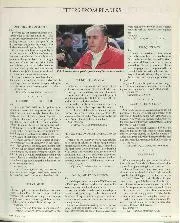
Noisy, smelly Donington
Sir, I had the pleasure to attend the VSCC meeting at Donington Park and relished the opportunity to see, hear and smell real motor racing. However I was bemused to…
THE GENTLE ART OF KILLING THE GOOSE
RECENT conversations with various racingdrivers who regularly compete at Brooklands Track have left us no alternative but to call attention, in clear terms, to the serious cleavage between drivers and authorities at Weybridge.
This growing antagonism has been fanned into a state of open hostility by the two latest moves of the authorities, first as regards record-breaking and second as regards handicapping.
Dealing with record-breaking, we refer to the decision that record laps of the Outer and Mountain circuits made during B.A.R.C. races will no longer be recognised. The new position is that if a driver wishes to attack a lap record he must pay the five-guinea fee for the timing apparatus to be brought out for a special run on a deserted track or during a race.
The first objection we have to this procedure is that it is contrary to the accepted practice ruling in the real home of motor-racing, the Continent, where recordlaps are only recognised when made during an actual race. Times without number lap-records are broken in practise, but only those made under the normal conditions of racing with other cars on the road are accepted as records. Our second difference of opinion with the Brooklands’ authorities on the wisdom of this decision is more in the nature of an appeal. Racing is a sufficiently expensive game, or profession, as it is. Surely it is worth the while of the authorities to give drivers the satisfaction of breaking records put up under racing conditions, rather than compel them to pay a further sum to have their efforts officially recog nised? The public are equally interested in these achievements, and in view of the heavy charges for admission and parking, may they not be allowed to know
that the cars they are watching are faster than those they have seen in previous years ?
The second cause of much bitter discussion wherever drivers meet is the question of handicapping. We will grant from the outset that the task of the handicappers is an unenviable one, and that many drivers, in order to recuperate part of the heavy expense of racing at Brooklands have been unable to resist the financial temptation of inproving their own handicap by means of last-minute tuning and careful pressure on the throttle-pedal during the first of two races in which they compete.
On the other hand these well-known subtleties on the part of the drivers are no justification for the incongruous handicapping which marred the race meeting on Easter Monday. At least two cases were so far removed from the publicly-known performance of the cars that the drivers concerned could only be applauded if they vowed never to race at Brooklands again.
It surely needs no emphasis that drivers, by means of their entry fees, contribute a substantial sum annually to the revenue of Brooklands, and that to kill the goose which lays this very acceptable golden-egg would be to the ultimate disadvantage of the Track.
a cause dissatisfaction at Brooklands, this time of a more intangible nature. It can best be summed up by saying that there is too much atmosphere of schoolmaster and schoolboy in the relations between the authorities and the drivers. Trivial offences are treated with a solemnity which would be amusing if it were not so irritating to drivers upon whose reputation the Track depends for its” gate.” With competant marshals it should be easy enough to distinguish between dangerous driving and minor incidents which harm no -one.